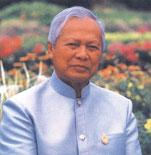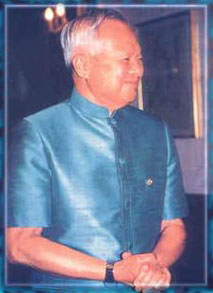|
FORMER
prime minister and Privy Councillor General Prem Tinsulanonda
called yesterday for the disclosure of "well-known" public
figures and government officials involved in illicit narcotics
dealings.
Counter-narcotics authorities were well aware of the identity
of these "national traitors", he said, but had never
disclosed them to the public.
"These people are well received and respected by society
because of their money. It seems money can provide them with everything,
"Prem told the first National Congress of Law, which was
attended by hundreds of officials, legal experts and professionals.
"In fact, these people have acquired their wealth illegally
and do not deserve public respect or recognition. Instead, they
must be dubbed ‘national traitors"; because they do not
love the country. They are, in fact, leading the country into
disaster," he said. Prem, who personally directed a successful
military operation to dislodge opium
warlord Khun Sa from Thailand in 1982, said drugs production,
sale and consumption had seriously increased and the country had
to use greater funds and personnel to combat the problem.
The drugs menace had gone from bad to worse, he said, especially
when anti-drugs authorities were themselves involved in narcotics
production and trafficking or helped facilitate these criminal
activities. "With such corn-play [by anti-drugs officials],
the country is facing a more complicated and difficult task to achieve
its fights against narcotics," he said.
Poverty was the most pressing problem for the country, Prem said,
and narcotics the second biggest challenge. The two were linked
as many poor people had turned to drugs - consumption or complicity
in trafficking or sale - to help them out of poverty or to forget
about economic hardship. If poverty could be eradicated, drug
problems would also be reduced, he said.
Drugs were "a major threat" to the country's peace
and development, the former premier said, because drug activities,
often led to other crimes, such as theft, robbery and rape. Illicit
drug activities were not ordinary crimes and thus all government
agencies needed to work out special measures to effectively and
rapidly combat and prosecute the people involved.
Drug problems demanded attention from all state agencies, Prem
said, including the justice, health, and education ministries.
Even the Foreign Ministry was involved because Thailand's
neighbours were both producers of drugs and the country's
partners in drugs suppression. The former premier's concerns
about drugs were echoed by other key speakers at the Law Congress.
Chaiwat Wongwattanasarn, secreatry-general of the Office of the
Council of State, who chaired a discussion session on Thailand’s
anti-drugs legislation, said the Foreign Ministry should negotiate
with Thailand’s neighbours for joint combat operations against
drug laboratories along their common borders. It should also seek
permission for Thai forces’ to undertake "hot pursuits"
of drug producers and traffickers across the frontier, he said.
Deputy Police Commissioner General Sant Sarutanont said Thailand
had difficulties combating drug smuggling because it shared long
borders – about 2,500 km of land and 2,500 km of sea frontier
- with its neighbours. There were 57 official checkpoints and
732 unofficial crossings along the whole frontier which people
used, and these were extremely difficult for the authorities to
control.
There were more than 50 drug laboratories across the border from
Thai-land, he said, and each had the capacity to produce about
one million pills of methamphetamine a month. "These pills
are smuggled through various crossings into the country,"
Sant added.
While drug abusers hurt themselves by consuming narcotics, other
people were the target of users’ criminal activities, such
as robberies. Sant said that in almost all drug-related crimes
those found to be key criminals or collaborators were either "illegal
aliens" or "illegal migrant workers".
Source: The Nation, Bangkok 16 Sep 2000
|
 generalprem.com
generalprem.com

